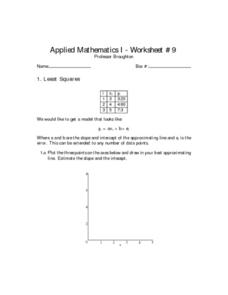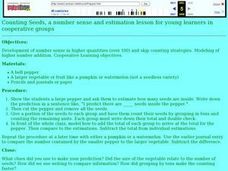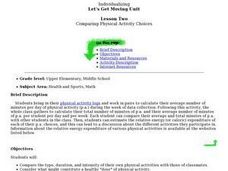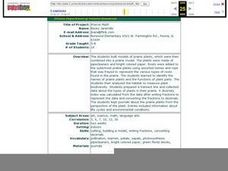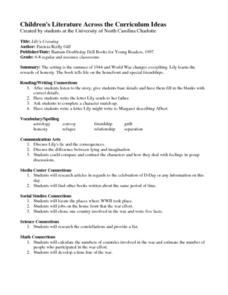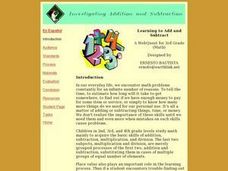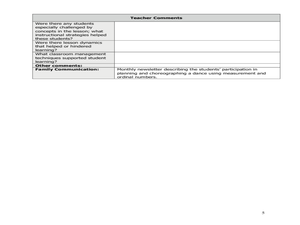Curated OER
Estimating With Decimals
How can we estimate the answers when working with decimals? That's what the question is as the class reviews two-digit decimal addition. Have them estimate by rounding to a whole number either before or after they have completed their...
Curated OER
Capture/Recapture
Students use proportions to estimate the size of populations. They describe the data with using a graph or table of the estimate. Students use descriptive statistics to calculate mean, median, and mode. They also compare and contrast an...
Curated OER
Louisville's Best Field Day Park
Students create a survey to hand out to determine the best field day park. Using their local area, they select five parks, if possible, that meet the criteria and calculate the distance and estimated time travel. They use this...
Curated OER
Relating Fractions and Decimals
Sixth graders identify how fractions and decimals both illustrate parts of a whole. They estimate which number is greater by comparing them to the given fraction and use greater than or less than symbols for each.
Curated OER
Least Squares
In this least squares activity, students solve 6 different problems that include the least squares of numbers. First, they plot 3 points on the axes shown and draw in their best approximating line. Then, students estimate the slope and...
NSW Department of Education
Relationships Between Formal Measurement Units: Measure and Record Mass in Kilograms and Grams
Teach the masses about the metric system with this hands-on measurement lesson. Given a fruit or vegetable, learners estimate, measure, and convert its mass using the metric units gram and kilogram.
Curated OER
Pumpkin Problems
Students participate in a lesson that has the intention of working on estimation skills. They use pumpkins to estimate the number of seeds are inside. They collect data for each pumpkin and compare it to the estimation. Students question...
Curated OER
Counting Seeds
Students practice skip counting strategies, estimation, and higher number addition. They estimate the number of seeds in bell pepper, and count seeds in groups of tens and ones after the teacher removes seeds from the pepper.
Curated OER
Who wants to Win Millions: 6th Grade Multiplication
Solving math problems for pretend monetary rewards sounds too good to be true. Practice and play this game with your 5th or 6th graders. They will multiple numbers by one, numbers ending in zero, and estimate answers.
Curated OER
Long Division - mathsblog.co.uk
In this long division worksheet, students review the algorithm for finding the quotient in long division problems. They use the process to answer 12 problems.
Curated OER
Estimation & Central Tendency
Eighth graders view pictures that show many objects, estimate amount that they think they saw, and take class data from estimation to find the mean, median, mode, and range for the class.
Curated OER
Students' Strides
Complete problems using base ten blocks to see the difference in the place value of a decimal and how it affects a number's value. Learners compare decimal values as well. Ample time for discussion and modeling are allowed in the...
Curated OER
Fractions
Students determine that a fraction is a part of a whole or part of a group. They write and read fractions and solve various fraction problems. They create their own fraction problem using colored candies for their classmate to solve.
Curated OER
Calories in a sports drink
How much can a company round numbers without being misleading? Learners investigate the accuracy of claims made by a sports drink company. Teachers could easily modify the activity by bringing in their own beverage bottles, or by taking...
Curated OER
Comparing Physical Activity Choices
A physical activity log will help your elementary students keep track of their activities. Your class will calculate the average number of physicaly active minutes per day. They compare with other students and then estimate the relative...
Curated OER
Prairie Math
Students work together to build models of prairie plants. Using the model, they estimate the height and then measure them using metric and standard units. They write a fraction to represent their part of the whole set and compare and...
Curated OER
Lily's Crossing
Students listen to a story, "Lily's Crossing," about life during a World War. After completing worksheets, they compare and contrast characters in the story. Using math skills, students develop a time line of the war, calculate the...
Lesson This!
Math Lesson Plan: Halloween Candy Counting
Post-Halloween learners bring in candy treats to use for counting practice. They estimate how full a bowl of candy will get when there are 100 and 200 pieces of candy counted and put in it. They take turns counting to 100 and 200;...
Curated OER
Food Pyramid Activity
In this food pyramid worksheet, learners fill in their choices in each of the food categories and estimate amounts eaten, then write their goals for food and activity for "tomorrow."
National Gallery of Canada
Counting Circles
Learners look at bands of colors and estimate how many rings of color there are. While working in groups, they come up with a plan of how to accurately count the rings. They attempt to find a pattern in the colors, and decide whether...
Curated OER
Learning to Add and Subtract
Young learners practice addition and subtraction to solve problems. They use a webquest application to model how to solve math problems using pictures, words and numbers, and also practice using multiplication and division.
Curated OER
Hershey Chocolate Fractions
In order for students to acquire knowledge about math concepts, and in particular fractions, they need concrete ways to practice an abstract concept.¿¿¿ Using Hershey bars builds on prior knowledge as most students have probably...
Curated OER
Dance and Math
Second graders examine human body movements by measuring the choreography of a dance. In this physical education lesson, 2nd graders participate in a creative dance which is based on specific movements of each limb, which students...
Curated OER
Early Mental Math: Practice
Pupils start from a given number and count forward by 1s, 2s, and 10s. They "make ten" in 4 addition problems, and add or subtract 2 in the rest. Finally, they circle the odd numbers in a list from 1-14.
Other popular searches
- Compatible Numbers to Estimate
- Estimate Numbers Lesson Plan
- Estimate Numbers Grade 5
- Round and Estimate Numbers






